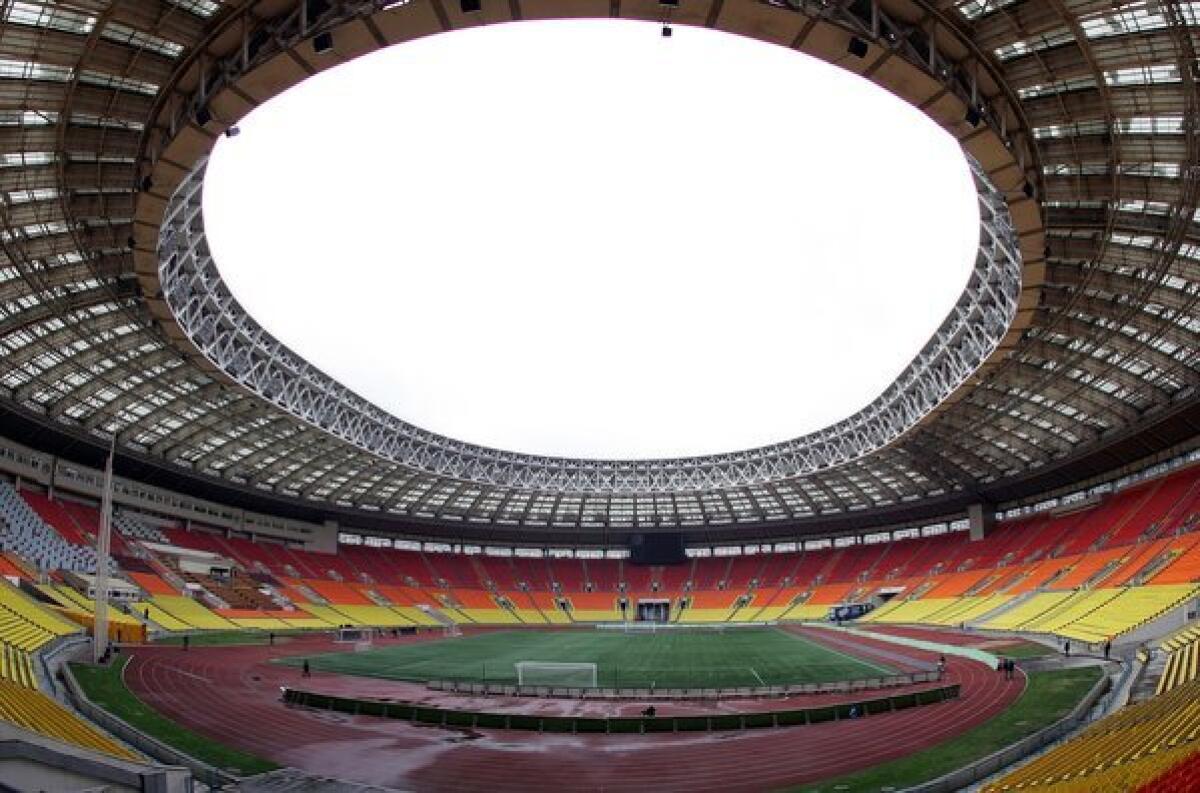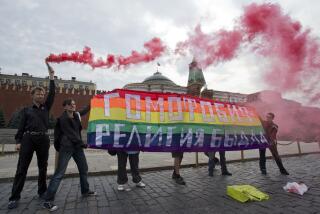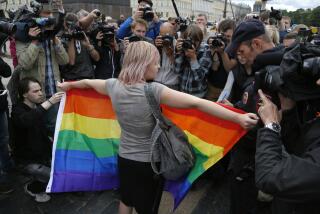Soccer World Cup 2018 host Russia is asked to explain anti-gay law

- Share via
The global soccer federation on Wednesday said it had asked 2018 World Cup host nation Russia for “clarification and more details” of a new law targeting gays and reminded Russian officials of their obligation to abide by rules against discrimination.
In a brief notice posted on the website of the Zurich-based International Federation of Association Football, known by its French acronym FIFA, the world soccer body said its statutes and code of conduct define important values and behavior in the sport and “foresee zero tolerance against discrimination based, among other, on sexual orientation.”
FIFA’s call for an explanation of the new Russian legislation’s aims and applications for visiting athletes, spectators and media echoed an appeal last week from the International Olympic Committee, which has awarded the 2014 Winter Games to the Russian Black Sea resort of Sochi.
Both the IOC and FIFA have been stirred to seek assurances that there will be no officially sanctioned discrimination against gays at their respective events amid mounting protests from human rights groups and demands that the prestigious competitions be boycotted or moved to a more tolerant venue.
Russian President Vladimir Putin last month signed into law a bill that punishes “propaganda of nontraditional sexual relations” with fines that can exceed $30,000. Foreign citizens violating the law face up to 15 days in jail and deportation. Although there has been no clear definition of the behaviors that would constitute a violation, the law has been said by its backers to target public displays of homosexuality or support for gay rights.
The law has inspired gay bars around the globe to dump Russian vodka brands, and LGBT organizations have appealed for a boycott of the Sochi Olympics, which begin in less than six months.
Western leaders, including President Obama and gay German Foreign Minister Guido Westerwelle, have said they oppose boycotting the Olympics because that would dash the dreams of athletes who have been training for years.
IOC President Jacques Rogge said this month that he had been given assurances from top Kremlin officials that the anti-gay law wouldn’t be applied to visitors attending the Feb. 7-23 Winter Games in Sochi. Rogge said Friday, however, that he had asked for “clarifications” before deciding whether Russia would be abiding by IOC rules respecting human rights.
Despite the furor over Russia’s targeting of gays, it is widely considered too late to change the location of the 2014 Olympics, even with the 2010 Vancouver, Canada, venue ready and available. But the 2018 soccer World Cup remains far enough away to allow FIFA to reconsider whether Russia would be an appropriate host.
Russia World Cup 2018 chief Alexey Sorokin added fuel to the controversy this week when he defended the anti-gay law and disparaged homosexuals as having no more right to flaunt their “ways of life” than did the Nazis.
“The Olympics and World Cup are not a stage for various views ... not for Nazis, not for any other ways of life. It should be about football and nothing else,” he told the online World Football Insider magazine in an interview.
Sorokin said the new law had been “misinterpreted,” as it was “designed against active propaganda of homosexuality, not against homosexuality itself. That is a big difference.”
The FIFA request for more information about the law followed publication of the soccer magazine interview, in which Sorokin asked rhetorically: “Would you like a World Cup where naked people are running around displaying their homosexuality? The answer to that is quite obvious.”
Meanwhile, in a setback for Olympic organizers, a senior official of the Brazilian government committee charged with preparing for the 2016 Summer Games in Rio de Janeiro resigned his post.
Marcio Fortes, head of the Olympic Public Authority, gave no explanation for his departure in his letter of resignation. But coming just two weeks before a team of IOC inspectors is to visit Rio, his departure heightened concerns about the nation’s ability to stage the event.
Brazil’s Olympic organizing committee has had two chief executives, three chief operating officers and four marketing directors in the last four years.
ALSO:North and South Korea agree to reopen industrial complex
‘Extreme abuses’ drive Doctors Without Borders out of Somalia
Egypt’s VP Mohamed ElBaradei resigns in protest against crackdown
Twitter: @cjwilliamslat
More to Read
Sign up for Essential California
The most important California stories and recommendations in your inbox every morning.
You may occasionally receive promotional content from the Los Angeles Times.











